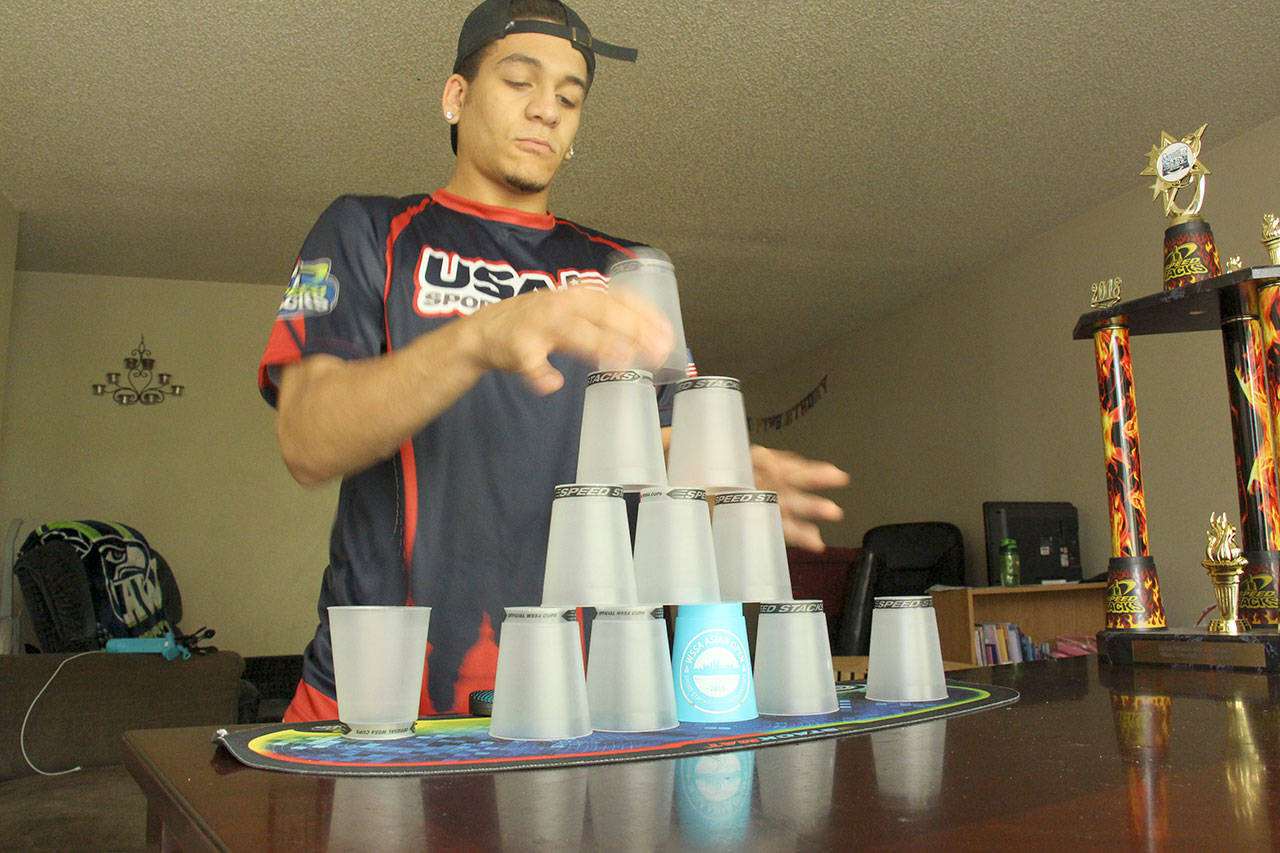By Max Wasserman/UW News Lab
Ezekiel McDowell has been obsessed with speed for as long as he can remember. His favorite superhero growing up was The Flash and he says he can solve a Rubik’s Cube in under 30 seconds. But for the last 12 years his need for speed has been satiated by something different.
Cup stacking.
McDowell, 21, is a regional cup-stacking champion. He’s made television appearances, performed at conventions and traveled the state assembling plastic cups into pyramids to the awe of spectators. The Federal Way resident is so fast that watching him stack cups is like pressing the fast forward button on reality: Blink and you might miss it.
But to McDowell and those who know him, speed is just the beginning. Friends and family see him as someone with an infectious personality, someone who breathes energy into every conversation. McDowell views the sport as a lesson in discipline and something that’s connected him to a global community.
For everyone involved, it’s more than just stacking.
“People know me for something I like to do,” McDowell said. “That’s the cool thing about it. You always want to do something you like to do and to get recognized for it makes you think you’re doing something right.”
McDowell began stacking much the same way any childhood obsession starts: through a holiday gift. He was 9, when for Ramadan, his grandmother bought him a timer and mat designed specially for stacking. He’d spend hours practicing — sometimes past midnight — sweating and filling the dining room of his mom’s apartment or dad’s house with the clatter of plastic.
McDowell’s parents at first thought it was a phase — something he would pick up and leave behind as he’d done with yo-yos and other games. But it quickly became all McDowell wanted to do. He’d spend most of his spare time practicing, which as someone who was homeschooled turned out to be more or less all the time.
“When he gets into something he just keeps going until he gets to where he wants to be,” Yolanda Lantigua, McDowell’s mom, said.
McDowell decided not long after that he wanted to compete in cup-stacking tournaments. So his mom entered him in a local competition, and he won. Soon after he was recruited by the tournament organizer to join a demonstration team that traveled across the state raising the profile of the sport. Now McDowell is one of the fastest cup stackers in the country.
Watching McDowell stack, it would seem that he’s singularly focused on the goal of improving his time. He knows exactly how much space his movements take up, how to root his legs, when to swivel his hips and slide the cups into order for a satisfactory time. With each repetition another layer of sweat forms on his forehead. His eyes drill into the cups like crosshairs on a deer.
Fast times are certainly important to someone as competitive as McDowell, but so is everything else that comes with stacking. McDowell has met friends from across the world through the sport. He said he feels at home in other states and countries thanks to these connections and the global community they afford.
“It’s bigger than the stacking,” said John Asotigue, a physical education teacher at Evergreen Heights Elementary in Auburn and McDowell’s first coach. “The older kids are coming back because they’ve made some super good friends, and that’s Ezekiel. That’s why he’s still going.”
For as much as McDowell has benefitted from cup stacking, so has the community benefited from him. Friends in and out of the cup-stacking community say McDowell brings positivity into every situation and is there to support them during tough times.
“In the mall, parents will come up to me and ask if I’m Ezekiel’s dad and say what a wonderful kid he is,” Michael McDowell, McDowell’s dad, said. “This will be my ex-wife’s friends that I don’t even know. They don’t even bring up the stacking; that’s secondary.”
Aside from what it’s brought to his life, McDowell still values stacking in itself as a test of skill. He’ll spend hours each day over the course of months trying to beat his personal records, sometimes besting them by only thousandths of a second. Shaving off time becomes such an infrequent feat that maintaining motivation can be difficult — a ongoing challenge in McDowell’s stacking career.
No challenge has been more intense than becoming the regional cup-stacking champion. On four different occasions, McDowell took second place at the Northwest cup-stacking championships. He’d walk away from each defeat with a temporary but intense disappointment. Some friends said he wouldn’t even want to talk.
The day of this year’s competition, March 3, things changed. McDowell’s time — 10.16 seconds measured through three different stacking styles — was less than one-tenth of a second faster than the second place finisher. After winning McDowell says there was some yelling, jumping and more than one self-congratulatory “I did it!”
“I didn’t let go of that trophy for the rest of the day,” McDowell said.
Increasingly, growing up is crowding out time McDowell would otherwise spend stacking. He works odd jobs here and there, but his aspiration is to go to college and become an audio producer and engineer. Saving money toward a car and motorcycle makes the barrier to competitions more financial than skill-based.
The problem when you hit adult life, McDowell said, is that you can’t keep up with the new kids joining the sport. There’s no longer enough time. Money is increasingly a factor. But one thing is the same: the friends and community you make through the sport.
Whether he continues stacking in the foreseeable future or not, McDowell said he is satisfied with that.
Max Wasserman is a student in the University of Washington News Lab.


